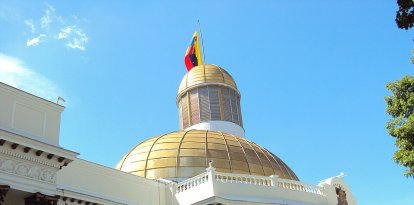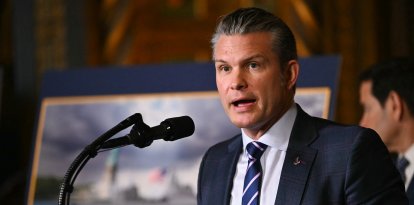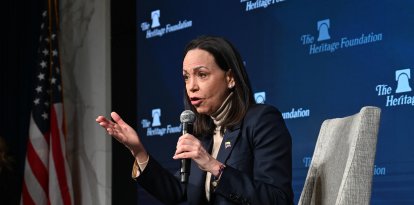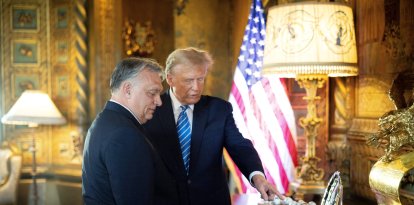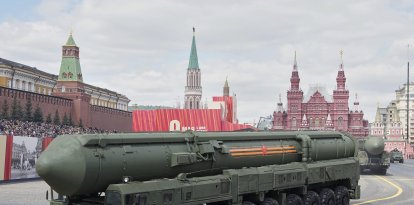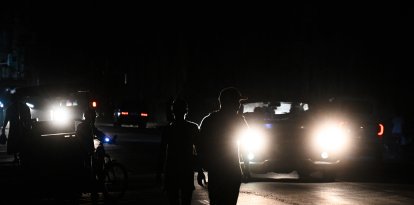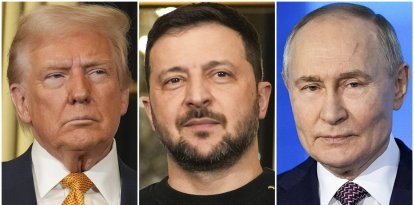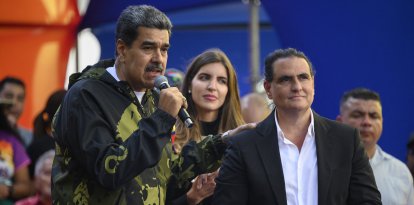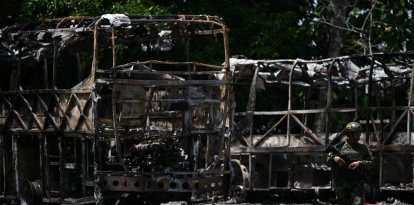Mega prisons, state of emergency and a tough crackdown on crime: The 'Bukele model' is inspiring the region
Honduras, Ecuador and Argentina. The "bukelization" of security in Latin American countries seems like an inevitable process.

Imagen de una cárcel de máxima seguridad en El Salvador. (AFP)
Today, Nayib Bukele is the most paradoxical president in the Western world. Branded as "controversial" by organizations and large global media, Bukele enjoys unprecedented popularity in the region thanks to his efficient security model, which has reduced homicides to historic lows and controlled gangs in his country.
For this reason, Bukele is almost revered by Salvadoran citizens and highly praised in the rest of Latin America since he turned the most violent country in the world into one of the safest with statistics in hand.
However, there is another side of the story: human rights defenders view the "Bukele model" with skepticism and question it due to the multiple complaints about the excesses of security officials and attacks against the press.
However, Bukele's critics barely get an echo in the mainstream media. In the popular narrative, El Salvador's security model has more followers than detractors inside and outside its borders. For this reason, many countries, without hesitation, are beginning to draw inspiration from the "Bukele model" to combat their own security problems.
Security in Argentina already uses tactics from the 'Bukele model'
Argentina is the latest country to implement the "Bukele model" in its prisons. This was made clear in the province of Santa Fe, home to one of the most violent cities in the world, Rosario.
On March 5, 72 hours after the shooting attack of two buses carrying nearly 100 members of the Santa Fe penitentiary service, a surprise search was carried out that went viral in the Piñero prison, which houses "high-profile" prisoners linked to the main drug trafficking gangs in Rosario, according to reports from La Nación.
In the photos of the search, you can see the prisoners sitting with their hands tied and their torsos naked, surrounded by heavily armed security personnel while the inspections were carried out. The Argentine media did not hesitate to define the procedure as a "Bukele-style" search.
"These operations are carried out randomly in all units, without defined schedules or days. The objective is to adjust control by forming a second inspection ring on highly-profile prisoners. These are those inmates suspected or accused of ordering crimes from prisons," reported the Ministry of Security of Santa Fe, regarding the various procedures that have been carried out for months.
According to La Nación, these procedures began after the new administration arrived last December. The sources explained to the media that, within the framework of the new provisions, 1,200 prisoners were removed from police stations and housed in the penitentiary service. The most dangerous inmates were also rearranged in higher-security prisons, and their visits were restricted.
"In some cases, the most dangerous, they visit with their relatives with glass in between and two people at a time," the newspaper reported.

Megaprisons, state of exception and a tough crackdown on crime: the “Bukele model” is inspiring the region
The Minister of Security and Justice of Santa Fe, Pablo Cococcioni, defended the procedures carried out, explaining that these searches do not apply to all inmates and are also necessary to protect the integrity of the officials.
"It is clear that a search in sectors of medium or high danger has to have strict restraint measures, for the strict protection of our staff," Cococcioni said before warning that the prisoners "are going to have a worse time."
"Of course, this is not for the entire prison population. Whoever does not understand it or has a very strong criminal commitment that does not make the decision to break, we will act very strongly against that," he stated in a dialogue with radio Mitre.
President Javier Milei's Minister of Security, Patricia Bullrich, spoke on X (Twitter) to defend the Santa Fe authorities and their operations.
"On Sunday, two buses from the Santa Fe Penitentiary Service were shot. A clear threat from drug traffickers in the prisons. In Rosario, Governor Pullaro acted clearly," Bullrich wrote. "In federal prisons we have the Management Protocol for High Risk Prisoners, with which we control the Santa Fe drug traffickers one by one so that they do not act and so that the prison is not a place of crime."
The message from Bullrich, who competed with Milei in Argentina's presidential primaries and came in third place, comes weeks after she praised the "Bukele model" and the Salvadoran president himself revealed that there is cooperation with Argentina on security matters.
However, even though the Ministry of Security in Argentina wants to replicate the Salvadoran model, Bukele warned: "The measures that we can share with Argentina would suddenly not have to be so drastic because they do not have problems as big as ours. For smaller problems, perhaps the medication can be smaller."
Ecuador and its mega prisons
Perhaps the most shocking thing about the "Bukele model" is its maximum security mega prisons, in theory, intended for the most dangerous and violent gang members in the Salvadoran country. The gangs that killed, raped and mutilated go to those penitentiary centers—criminals who, at least within those prisons, are genuinely subjected to a heavy-handed prison system.
Ecuador, which in a matter of years has become the most dangerous country in Latin America, even above Venezuela according to various indexes, has been facing a practically unprecedented security crisis since January 8, after it became known that the drug trafficker Adolfo Macías, alias "Fito," escaped from a prison in Guayaquil.

Ecuadorian military in the streets
The escape of said drug trafficker generated an impressive wave of violence in the South American country. The gangs hijacked television channels, murdered civilians and orchestrated riots in various prisons throughout the country.
Since that day, the criminal gangs, which dominate the drug trafficking routes and extended their tentacles within the Ecuadorian judicial, penal and political system, remain at war with the government of President Daniel Noboa, 36, who boosted his campaign thanks to his rhetoric against narcoterrorism and narcopolitics.
Just as in El Salvador, since January 8, Noboa imposed a state of emergency that he renewed for 30 days on March 8 due to the "serious internal commotion" and the "internal armed conflict."
Likewise, in addition to the state of emergency, in January, Noboa presented a plan to build two Salvadoran-style mega prisons for maximum-security prisoners, which would replicate, in part, the "Bukele model."
The problem, according to experts, is that the violence crisis in Ecuador differs from that experienced in El Salvador for years, with the gangs being very different from the drug trafficking gangs that orchestrate the violence in the South American country.
Honduras, failure one year after its "bukelization"
Before Argentina and Ecuador, Honduras, a neighbor of El Salvador, carried out a radical change in its security policy, emulating the "Bukele model."
In December 2022, pressured by the economic powers in her country and her own unpopularity, President Ximena Castro imposed a state of emergency in areas with higher crime rates in response to the actions of criminal groups, especially gangs.
Mainly, Castro's decree partially suspended constitutional rights in Honduras that guarantee free movement, the right of assembly and the inviolability of the home, multiplying efforts to repress the Mara Salvatrucha (MS13) and Barrio 18 gangs.
The problem, basically, was the results.
An analysis by the InSight Crime organization compared the effects of the state of emergency in both countries, leaving the Castro Government in a terrible position.
According to the organization, traditional hotspots of violence spread beyond Tegucigalpa and San Pedro Sula, and, in addition, crimes such as extortion spread even faster during the Honduran state of emergency.
Overall, Honduras not only failed to stop existing extortion groups but created two new extortion groups.
The only relative success for Honduras was, perhaps, the slight reduction in the homicide rate, which went from 38.14% in 2022 to 31.14% in 2023, which continues to be the highest in the region.
In addition to the state of emergency, the Honduran government also transferred 1,500 prisoners to maximum security prisons and also promised the construction of a mega prison on an island to combat the gangs, measures similar to those taken by Bukele.
However, even though many organizations and media point out that Honduras has become "bukelized" in terms of security, the Honduran country's own Minister of Security, Gustavo Sánchez, said in an interview with Expediente Público that the Castro Administration is not replicating the "Bukele model," but is trying to carry out its own policy.
"It was a bit funny when the measures were taken in the prisons. There were some television shots with the gang members who were handcuffed and everything, the media that previously demanded that we do what Bukele did, began to criticize the bukelization of the country," said Minister Sánchez.
Paraguay, Colombia and Peru attracted by the Bukele model
In December 2023, the government of Paraguay launched a police and military mega-operation to regain control of the prison known as Tacumbú, located in the capital Asunción.
In the operation, seven prisoners and a police officer died, in addition to the 30 agents and 20 inmates who were injured. According to the government, 1,500 police officers and 1,000 military personnel were mobilized. In addition to regaining control of Tacumbú, they also fulfilled their objective of dismantling a drug distribution scheme that operated with impunity from prison.
After the successful operation, the Paraguayan president, Santiago Peña, assured that Bukele's security policy inspired him and led him to approve the operation in Tacumbú, known as "Veneratio."
"I cannot deny it, the experience of El Salvador, of Nayib, has also been a factor of encouragement to confront these criminal groups. President Nayib Bukele is a figure who has gained preponderance today. Before his arrival, El Salvador was one of the most insecure and criminal countries in the world. He generated a tremendous change and that generated a lot of attention," Peña stated.

At least 12 injured during a military intervention in the largest prison in Paraguay | Screenshot Ministry of the Interior
The words of the Paraguayan president demonstrate, in effect, how Bukele has managed to influence governments and even political campaigns directly.
For example, in Colombia, Diego Molano and Jaime Arizabaleta, candidates for mayor of Bogotá and Cali, respectively, proposed building mega prisons inspired by those in El Salvador.
Likewise, in Peru, the mayor of Lima, Rafael López Aliaga, praised President Bukele's security policy.
"The 'Bukele plan' has worked a miracle in El Salvador. We are in contact with his security team and want to implement something similar," said López Aliaga in statements reported by La República.
The reality is inescapable: Bukele, despite all the controversy surrounding his management, is inspiring Latin America with his security policy.













